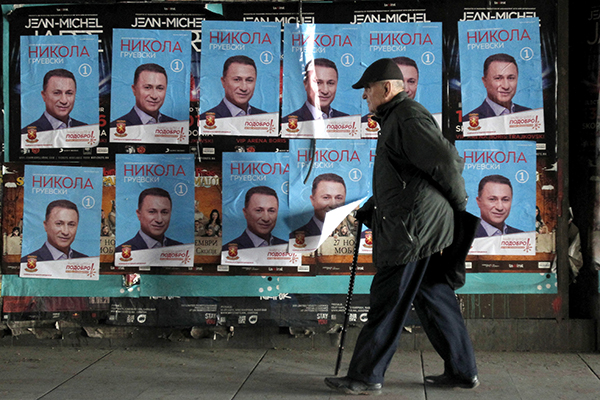As the political crisis in Macedonia, triggered by allegations of mass surveillance by intelligence agencies, deepens the environment is increasingly unsafe for journalists who report critically on the ruling Internal Macedonian Revolutionary Organization-Democratic Party for Macedonian National Unity (VMRO-DPMNE) and its leader, Nikola Gruevski.
The party has been at odds with the critical media since it first dominated Macedonia’s political scene in 2006, but tensions reached a peak in recent weeks after Gruevski, in an interview with local newspaper Republika, accused the critical media of being foreign mercenaries working in the interests of financier George Soros.
Some independent journalists say that since the former prime minister’s comments were published, they have been verbally assaulted or threatened. A news crew for a critical outlet was also beaten while covering a VMRO-DPMNE rally.
Gruevski’s interview was published shortly after Macedonia held early elections in December, as part of efforts by the EU and U.S. to bring the country’s opposing parties to the negotiating table. The country has been divided since allegations by the opposition Social Democratic Union party that the secret service surveilled more than 20,000 Macedonians led to mass protests after the ruling party attempted to halt an investigation into the claims. However, the elections have so far failed to achieve stability and Gruevski’s party has not yet formed a coalition government.
Against this backdrop,VMRO-DPMNE leaders and supporters have lashed out at perceived external enemies, including journalists and news outlets considered pro-opposition. In January for instance, Milenko Nedelkovski, a talk show host and party supporter, published the names and addresses of several critics, including journalists, on his Facebook profile, the Balkan Insight reported.
Borjan Jovanovski, founder of the independent website Nova TV, is one of the journalists who says he has been threatened in recent weeks. He said he has increased security at his home to protect his family after a teenager threatened him in a restaurant in the capital, Skopje, on March 2. Jovanovski, who is also a former editor at the now-defunct privately owned broadcaster A1 TV, said the boy spat at him and called him a traitor. Although he has been a target of previous attacks–on one occasion, Jovanovski said, he was sent a funeral wreath bearing his name–the journalist said he feels more at risk after this incident because he suspects it was instigated by a party official.
In a similar incident the same week, three teenagers went to the home of critical columnist Branko Trickovski, and called him a traitor. Trickovski said the atmosphere is hard to bear. He said smearing stories about opponents of the ruling party “are being made up daily” and spread on pro-government media and social media. He added that attempts to intimidate opposition supporters and journalists is happening more regularly. “Cars are being torched, funeral wreaths sent to their homes, kids to their doors, financial assets cut down,” he said. Trickovski said he has been targeted by smear stories and that his wife is regularly harassed.
Also in March, Vladimir Zelceski, a reporter for opposition news website A1on, and Aleksandar Todevski, a camera operator for the site, were hospitalized after being beaten at a VMRP-DPMNE rally. The journalists suffered head injuries and their equipment was damaged in the attack, according to reports. One person has been charged with the attack, Predrag Petrovic, the editor of A1on, said. He added that he believes the journalists were targeted because the news outlet is critical of the party.
“Attacks on journalists started after Nikola Gruevski openly called for settling scores with ‘traitors’,” Petrovic said, referring to the former prime minister’s Republika interview. Gruevski alleged in the interview that media supported by international organizations, including the Open Society Foundation, have a political agenda.
Ivo Kotevski, a spokesperson for VMRO-DPMNE, denied that the party is encouraging supporters to harass the press, and said that the opposition Social Democratic Union (SDSM) and its leader Zoran Zaev, have targeted pro-government media.
“Zaev and the media under the control of SDSM/Soros have been accusing us of anything and everything, but it only shows the despair which they are in, their lack of ideas and the fear that they will not be able to deliver on the tasks they have been given,” Kotevski said. Kotevski said that Zaev has called pro-government media “enemies” and he cited incidents where Zaev’s supporters allegedly attacked news outlets during the election campaign. CPJ was unable to independently verify details of the incidents the spokesperson cited.
Petrovic said that the current climate for journalists is a continuation of how the ruling party tries to control the press. “For 10 years the government has been taking full control of the media through businessmen close to it or via government-sponsored advertisements,” Petrovic said, referring to how VMRO-DPMNE favors supportive media by rewarding them with state advertisements. Journalists with whom I spoke said the uneven distribution of funding has left them marginalized. Macedonia, an EU accession country, has been criticized for this practice in the European Commission’s annual progress reports.
Should the hostile rhetoric against journalists continue, and the political limbo be prolonged, the foreseeable future for Macedonia could be marked by instability, with Gruevski and his close circle unlikely to let go of power, and the opposition, encouraged by months of protests, unlikely to back down.
